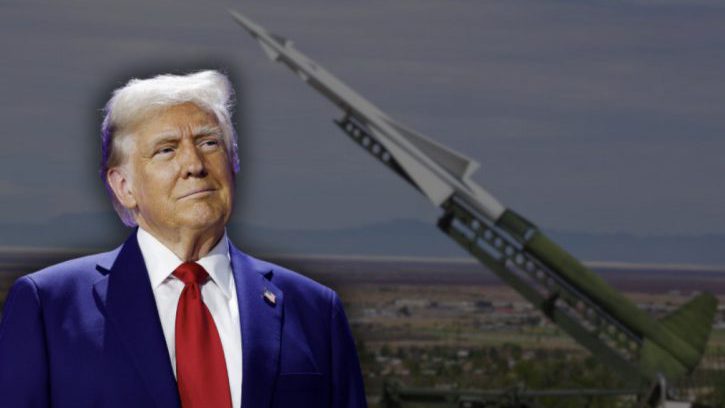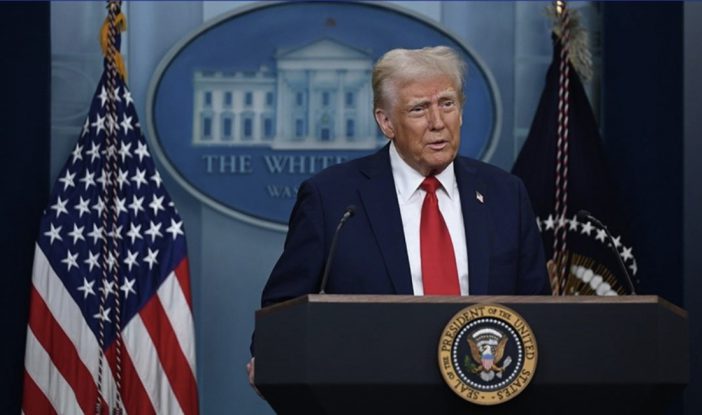Although he has put off his decision on active US intervention, one thing is for certain, Donald Trump will not let himself be proclaimed the Neville Chamberlain of our century. Opinion.
Like the looping video clips on TikTok and Instagram, year after year world leaders gather at various summits for the same earnest talks on the same serious issues without resolving any. They manufacture a smile for the official photo before leaving for the next summit. All talk and no action, as the saying goes.
President Donald Trump, who obviously relishes talking, is nevertheless a man of action. He attended the Group of 7 summit in Canada but left early to consider what he should do in Israel’s existential battle with Iran beyond the G7’s insipid statement calling for “de-escalation of the conflict.”
In his first term in office, Trump acted decisively on a smaller scale by ordering a lethal drone strike on General Qasem Soleimani, commander of Iran’s Quds force.
His decision now may be to order a B-2 Stealth Bomber, carrying a 20-foot-long, 30,000 pound “bunker busting” bomb—to break through the Iranian mountain shielding Iran’s most protected nuclear site.
He may even consider sending a drone after Iran’s Supreme Leader, Ayatollah Ali Khamenei, overlord of Hezbollah, Hamas, Palestinian Islamic Jihad and the Houthis in Yemen–each group being methodically destroyed by Israel.
Although he has put off his decision on active intervention, one thing is for certain, Donald Trump will not let himself be proclaimed the Neville Chamberlain of our century.
He missed the chance in his first term of office to end the four decades of Iranian threats against the United States that began in 1979 with the seizure of the U.S. Embassy in Tehran.
But six other presidents during those decades merely kicked that can (of worms) down the road. Jimmy Carter, Ronald Reagan, George H. W. Bush, Bill Clinton, and George W. Bush all suffered the insults, threats, and actual attacks by Iran and its proxies while thinking they could “find common ground and talk some sense” into fanatics. A bomb placed by Hezbollah in Beirut in 1983, under Reagan’s watch, killed 241 American servicemen, an infamy that went unpunished.
President Obama only made things worse by lifting all sanctions on Iran, giving them money and trusting them to adhere to agreements.
“There are idiots in America who still think they can talk with Adolf Hitler about a compromise,” wrote the German justice inspector Friedrich Kellner in 1941, noting the celebrity aviator Charles Lindbergh and his antiwar movement that kept America neutral for the first two years of WWII. “Mankind, awake!” insisted Kellner. “Concentrate your strength against the destroyers of peace! No more resolutions or rhetoric! Advance against the enemy of mankind!”
In a scathing one-line critique he summed up the United Nations’ predecessor, the League of Nations: “Tiresome talk and tokens of sympathy without any follow-up action!” And he wanted to know, “Where were men who could recognize the reality?”
As an organizer for the Social Democratic Party, Kellner had campaigned against Hitler and his Nazi Party throughout the entire time of the ill-fated Weimar Republic. When Hitler came to power, Kellner began a diary to record Nazi crimes and the German people’s overwhelming approval of the murderous agenda. His outspokenness against the regime marked him as a “bad influence” and he was placed under surveillance by the Gestapo. His position as a courthouse administrator gave him some protection from arbitrary arrest.
Kellner lambasted the Allies’ inaction as Hitler rearmed Germany. “The Western nations will carry the historical guilt for not promptly providing the most intensive preventive measures against Germany’s aggression,” he declared. “The French watched calmly and did nothing as Hitler built a huge arsenal.” The British were equally guilty for not responding decisively to the obvious threat. “Chamberlain should have been a parson in a small village, not the foremost statesman of a world power! He should have immediately countered Hitler.”
Kellner regarded Winston Churchill as one of the few politicians who did see the reality, and who might have preempted the war had Churchill received the reins of government sooner from Neville Chamberlain.
The justice inspector reserved a special contempt for nations earning money through trade with the aggressor Germany, claiming “neutrality” while their neighbors were under attack. States like Sweden and Switzerland grew rich supplying Germany with raw materials and services.
“When you stand on the sidelines during a fight for human dignity,” Kellner wrote, “you side with the terrorists.”
It is easy to imagine Friedrich Kellner’s response today to France, the UK, and Germany’s reinforcement of the Iranian terror regime with substantial deals and investments in Iran’s energy, automotive, and other sectors.
And Kellner would have been especially abhorred by the way these “Allies” seemed to cloak their own greed by turning Israel into a pariah nation for defending itself against the constant onslaughts of Iran’s proxy armies.
Even now, as Israel pummels Iran and strips it of its nuclear ambitions, the European Union appallingly pushes for Iran’s survival.
But President Trump who, like Churchill, can also see the reality, insists Iran will not have nuclear weapons. He gave diplomacy a chance for six months, receiving back only lessons in the Ayatollah’s devious ways. He has now decided he will give talks only two more weeks before taking another course.
Perhaps the solution will have to be a B-2 bomber and a bunker buster.
After all, in place of talk comes action.
Robert Scott Kellner is a U.S. Navy veteran and retired English professor. Kellner taught at the University of Massachusetts and Texas A&M University. The grandson of Friedrich Kellner, he published the diary in its original language in Germany in 2011 and is the editor and translator of the English edition, My Opposition: The Diary of Friedrich Kellner–A German against the Third Reich, Cambridge University Press, United Kingdom, 2020.





